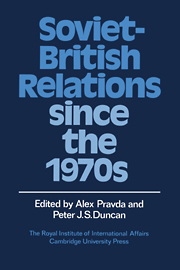Book contents
- Frontmatter
- Contents
- Contributors
- Acknowledgments
- 1 Introduction: pre-perestroika patterns
- 2 The historical perspective
- 3 Soviet perspectives on Britain and British foreign policy
- 4 British perspectives on the Soviet Union
- 5 The security dimension
- 6 Anglo-Soviet relations: political and diplomatic
- 7 The Soviet Union and the Left in Britain
- 8 Anglo-Soviet cultural contacts since 1975
- 9 Trade relations: patterns and prospects
- 10 Doing business with the USSR
- 11 Conclusions: Soviet-British relations under perestroika
- Index
5 - The security dimension
Published online by Cambridge University Press: 29 October 2009
- Frontmatter
- Contents
- Contributors
- Acknowledgments
- 1 Introduction: pre-perestroika patterns
- 2 The historical perspective
- 3 Soviet perspectives on Britain and British foreign policy
- 4 British perspectives on the Soviet Union
- 5 The security dimension
- 6 Anglo-Soviet relations: political and diplomatic
- 7 The Soviet Union and the Left in Britain
- 8 Anglo-Soviet cultural contacts since 1975
- 9 Trade relations: patterns and prospects
- 10 Doing business with the USSR
- 11 Conclusions: Soviet-British relations under perestroika
- Index
Summary
INTRODUCTION
Great Britain and the Soviet Union emerged from the Second World War as victors, as two of the Big Three powers. The central factors of the balance of power in the post-war world, namely the strategic role of nuclear weapons and the resultant bipolarity of world power relations, and the new alignment of world economic relations did not emerge for some time after the war. For these reasons, there was at first a marked continuity in British foreign policy in the first years of the post-war era, in which Britain continued to pursue its Great Power role in terms of global commitments and as the major power in Western Europe.
Despite impressive elements of continuity, however, profound changes were already beginning to make themselves felt. The United States had without any doubt emerged as the dominant partner of the Allies. Britain, while still clearly the third most powerful nation in the world, could not come near to matching American or Soviet power. As a result of the war and the consolidation of Soviet power in Eastern Europe, Moscow soon began to assume a central position in British defence and foreign policy. The conciliatory attitude to the wartime ally did not last as long in London as it did in Washington, and thus for Britain the Soviet Union assumed at a much earlier time the central position as the main threat to Western security. In the early post-war period, Britain was clearly the most important European power from the Soviet perspective. Militarily, it represented the only potential opponent of significance apart from the United States.
- Type
- Chapter
- Information
- Soviet-British Relations since the 1970s , pp. 92 - 119Publisher: Cambridge University PressPrint publication year: 1990



